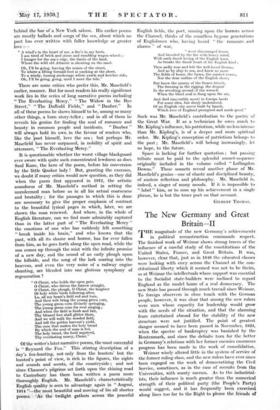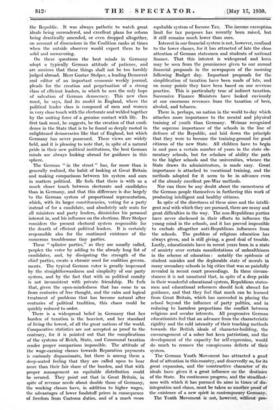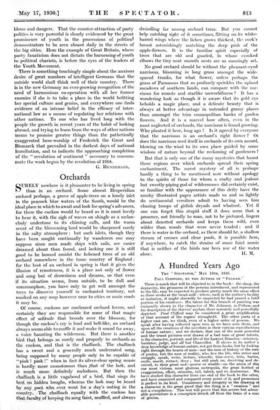The New Germany and Great
THE magnitude of the new Germany's achievements in political reconstruction commands respect. The finished work of Weimar shows strong traces of the influence of a careful study of the constitutions of the United States, France, and Great Britain. It was, however, clear that, just as in 1848 the educated classes were looking with envy across the Channel at the con- stitutional liberty which it seemed was not to be theirs, so at Weimar the intellectuals whose support was essential to the Socialist state-builders were inclined to regard England as the model home of a real democracy. The new State has passed through much travail since Weimar. To foreign observers in close touch with the German people, however, it was clear that among the new rulers were men whose capacity for leadership would grow with the needs of the situation, and that the alarming fears entertained abroad for the stability of the new structure were not justified. The point of greatest danger seemed to have been passed in November, 1928, when the spectre of bankruptcy was banished by the Rentenmark, and since the definite turn for the better in Germany's relations with her former enemies enormous progress has been made in the work of consolidation.
Weimar wisely altered little in the system of service of the former ruling class, and the new rulers have ever since been engaged on the work of democratizing the Civil Service, sometimes, as in the case of recruits from the Universities, with scanty success. As to the industrial- ists, their influence is much greater than the numerical strength of their political party (the People's Party) would suggest, and it has frequently been exercised along lines too far to the Right to please the friends of the Republic. It was always pathetic to watch great ideals being surrendered, and excellent plans for reform being drastically amended, or even dropped altogether, on account of dissensions in the Coalition ranks at times when the outside observer would expect them to be solid and unwavering.
On these questions the best minds in Germany adopt a typically German attitude of patience, and are anxious that these things shall not be too harshly judged abroad. Herr Gustav Stolper, a leading Democrat and editor of an important economic weekly journal, pleads for the creation and perpetuation of a strong Class of efficient leaders, in which he sees the only hope of salvation of German democracy. This new class must, he says, find its model in England, where the political leader class is composed of men and women in very close touch with the electorate and welded together by the uniting force of a genuine contact with life. Its first task must, he suggests, be the creation of that confi- dence in the State that is to be found so deeply rooted in enlightened democracies like that of England, but which Germany has never possessed. These views are widely held, and it is pleasing to note that, in spite of a natural pride in their new political institutions, the best German minds are always looking abroad for guidance in this sphere.
The German " in the street " has, far more than is generally realized, the habit of looking at Great Britain and making comparisons between his system and ours in matters political. He feels that there is with us a much closer touch between electorate and candidates than in Germany, and that this difference is due largely to the German system of proportional representation, which, with its larger constituencies, voting for a party instead of for a candidate, and absolutely safe seats for all ministers and party leaders, diminishes his personal interest in, and his influence on the elections. Herr Stolper considers the present electoral system responsible for the dearth of efficient political leaders. It is certainly responsible also for the continued existence of the numerous troublesome tiny parties.
These " splinter parties," as they are usually called, -perplex the voter by adding to the already long list of candidates, and, by dissipating the strength of the chief parties, create a chronic need for coalition govern..
meats. The typical German voter is greatly- impressed by the straightforwardness and simplicity of our party system, and by the fact that with us political enmity is not inconsistent with private friendship. He feels -that, given the open-mindedness that has come to us from centuries of free thought, and the calm and logical treatment of problems that has become natural after centuries of political tradition, this - chaos could be quickly reduced to order.
There is a widespread belief- in Germany that her burden of taxation is the heaviest, and her standard of living the lowest, of all the great nations of the world.
Comparative statistics are not accepted as proof to the contrary, for it is pointed out that the complications of the systems of Reich, State, and Communal taxation render proper comparison impossible. The attitude of the wage-earning classes towards Reparation payments is curiously dispassionate, but there is among them a deep-seated feeling that they are called upon to bear more than- their fair share of the burden, and that with proper management an equitable distribution could be secured. They point out that in Great Britain, in spite of revenue needs about double those of Germany, the working classes have, in addition to higher wages,: the advantages of lower foodstuff prices in consequence of freedom from Customs duties. and of a much more equitable system of Income Tax. -The_income exemption limit for tax purposes- has recently been raised, but it still remains much lower than ours, Interest in our financial system is not, however, confined to the lower classes, for it has attracted of late the close attention of German statesmen and students of national finance. That this interest is widespread and keen may be seen from the prominence given to csur annual financial proposals in the newspapers of the morning following Budget day. Important proposals for the simplification of taxation have been made of late, and on many points they have been based on our revenue practice. This is particularly true of indirect taxation. Successive Finance Ministers have looked enviously at our enormous revenues from the taxation of beer, alcohol, and tobacco.
There is, perhaps,- no nation in the world to-day which attaches more importance to the mental and physical training of youth than Germany. Weimar recognized the supreme importance of the schools in the line of defence of the Republic, and laid down the principle that they were to become the training-ground for good citizens of the new State. All children have to begin in and pass a certain number of years in the state ele- mentary schools, but for scholars of ability the path to the higher schools and the universities, whence the State draws its administrators, is made easy. Great importance is attached to vocational training, and the methods adopted for it seem to be in advance even of the already excellent pre-War methods.
Nor can there be any doubt about the earnestness of the German people themselves in furthering this work of producing intelligent and healthy citizens.
In spite of the directness of- these aims and the intelli- gent zeal with which they are pursued, there are many and great difficulties in the way. The non-Republican parties have never slackened in their efforts to influence the young mind in the schools, and it has proved impossible to exclude altogether anti-Republican influences from the schools. The problem of religious education has always given, and is still giving, a good deal of trouble. Lastly, educationists have in recent years been in a state of anxiety over certain manifestations of unhealthiness in the scheme of education : notably the epidemic of student suicides and the deplorable state of morals in many secondary schools in big cities that was so painfully revealed in recent court- proceedings. In these circum- stances it is not unnatural that, in spite of a deep pride in their wonderful educational system, Republican states- men and educational reformers should look abroad for guidance, and that they feel that much can be learned from Great Britain, which has succeeded in placing the school beyond the influence of party politics, and in reducing to harmless proportions the conflict between religious and secular interests. All progressive German educationists feel that an advance frona the characteristic rigidity and the cold intensity of their teaching methods towards the British ideals of character-building, the encouragement of a sober but keen patriotism, and the development of the capacity- for self-expression, would do much to - remove the conspicuous defects of their system.
The German Youth Movement has attracted a good, deal of attention in this country, and deservedly so, for its great expansion, and the constructive character of its ideals have given it a great influence on the destinies of the State. Its continuous progress, and the steadfast- ness with which it has pursued its aims in tithes of dis- integration -and chaos, must be taken as another proof of the existence of a new spirit in contemporary Germany.
The Youth Movement is 'not, however, without prv-- blems and dangers. That the counter-attraction of party politics is very powerful is clearly evidenced by the great prominence of youth in the processions of political demonstrators to be seen almost daily in the streets of the big cities. Here the example of Great Britain, where party fanaticism does not dictate the harnessing of youth to political chariots, is before the eyes of the leaders of the Youth Movement.
There is something touchingly simple about the anxious desire of great numbers of intelligent Germans that the outside world shall think well of their country. There is in the new Germany an ever-growing recognition of the need of harmonious co-operation with all her former enemies if she is to take a place in the world befitting her special culture and genius, and everywhere one finds evidence of an intense belief in the efficacy of inter-. national law as a means of regulating her relations with other nations. To one who has lived long with the people the growth in recent years of the habit of looking abroad, and trying to learn from the ways of other nations 'seems to promise greater things than the pathetically exaggerated hero-worship of Frederick the Great and Bismarck that prevailed in the darkest days of national humiliation, and to indicate the approaching 'completion of the " revolution of sentiment " necessary to consum- mate the work begun by the revolution of 1918.
G. HENDERSON.
















































 Previous page
Previous page